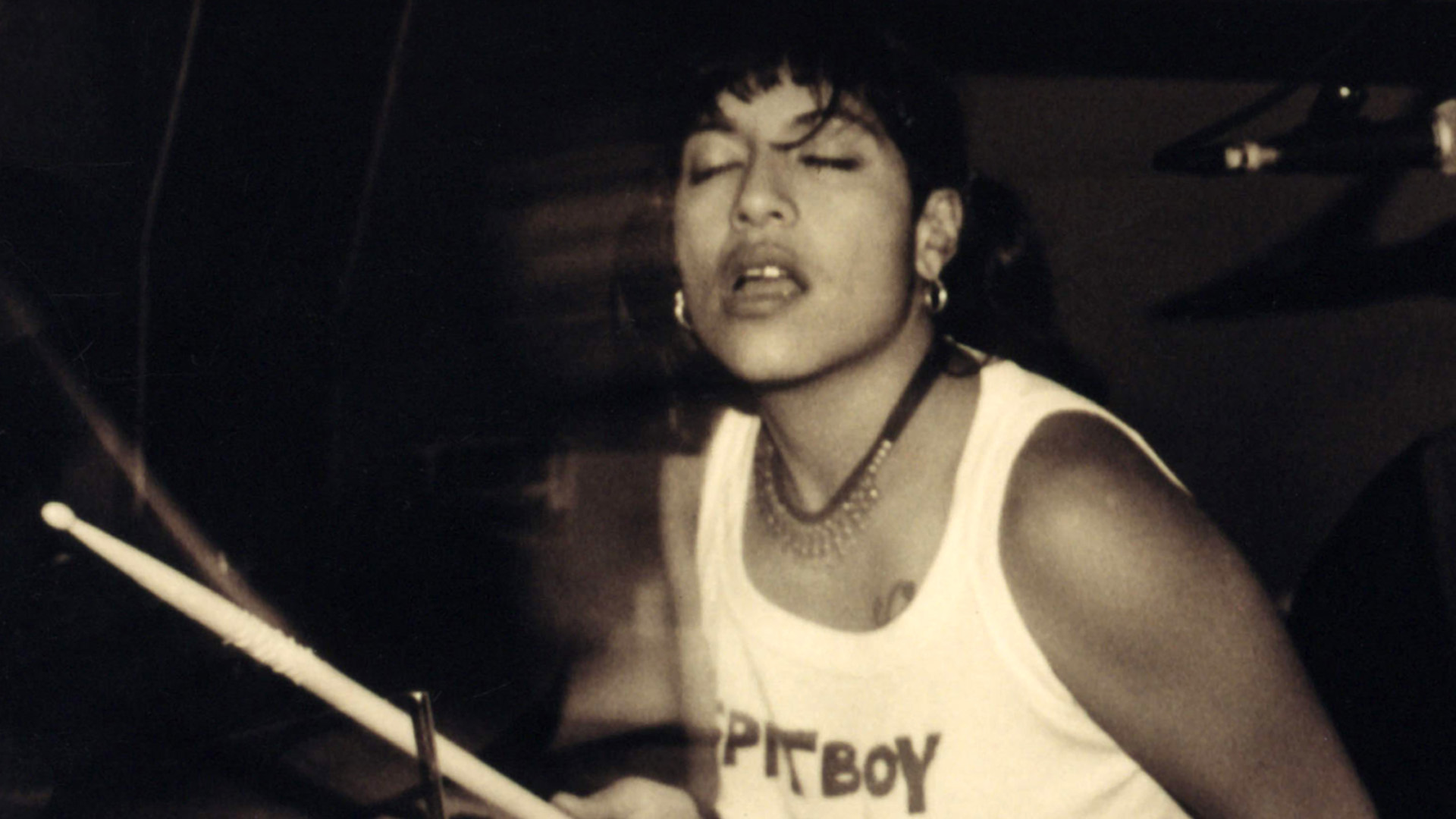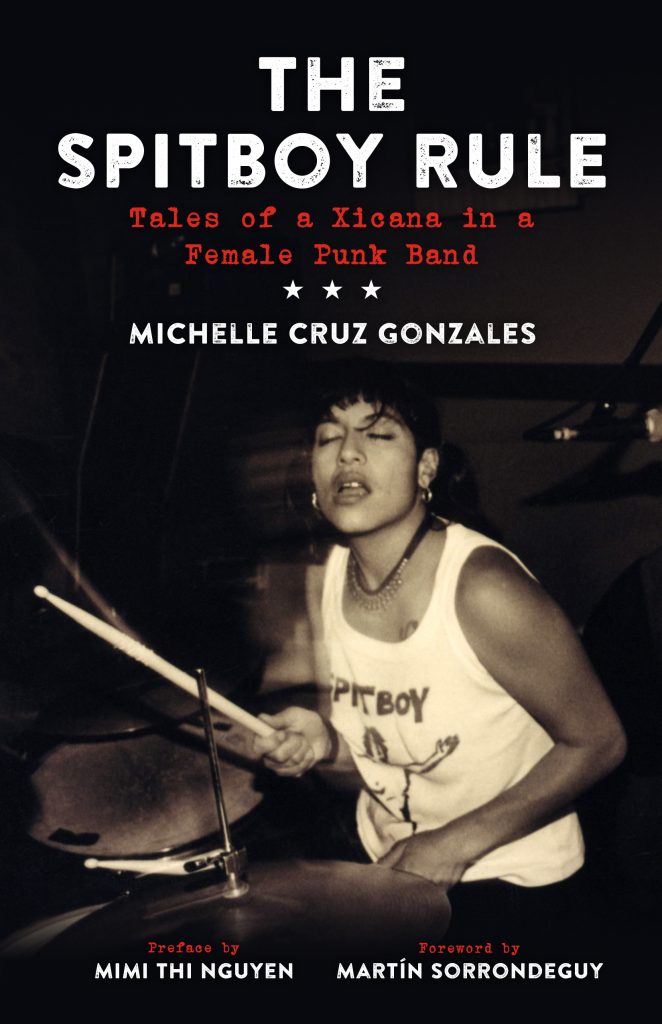
By Angela Ruggiero
East Bay Times
October 8th, 2016
LIVERMORE
— Clues in Michelle Gonzales’ college English class hint there’s a
deeper story: the dark hair with red highlights, black-rimmed glasses
and tattoos peeking out from behind the professor’s sleeves.
Most of the Las Positas Community College students are too young to know that the woman at the head of the class was a hardcore punk rock star in a groundbreaking all-female punk band in the 1990s.
The band, Spitboy, set a standard for other female punk rockers at the time, performing in front of thousands at Bay Area venues such as 924 Gilman in Berkeley and on tours in Europe and Asia.
Gonzales was a
drummer with a fierceness who, along with her three fellow bandmates,
pushed boundaries when writing about feminist issues, such as domestic
violence and sexism.
The band, she says, faced misogyny and sexism
in a mostly male-dominated punk music subculture. And for Gonzales, who
is of Mexican heritage and was the only person of color in the group,
colorblindness and racism also were factors.
What Gonzales sang about when she was in Spitboy “translates to the types of projects that she’s taking on on campus,” said Los Positas College Dean of Arts and Humanities Don Miller.
Gonzales is the faculty adviser for the college’s Puente Project, which connects disadvantaged students to mentors and counseling programs. Gonzales also is co-chair of the Basic Skills Committee on campus, which focuses on helping students with achieving college-level English and math skills.
Miller said he didn’t know about Gonzales’ history as a punk star until he read her book, “The Spitboy Rule: Tales of a Xicana in a Female Punk Band,” released in April.
But now with her background and push for social justice through her involvement at the college, it makes sense, Miller said.
Gonzales, known as “Todd” during her band days and now by friends who knew her then, teaches English and creative writing courses at the Livermore college. At least once a year, Gonzales joins in the English department’s own band, the “Rawk Hawks,” changing the lyrics to popular songs to sing about community college budget cuts or grading papers.
Gonzales, who was born in east Los Angeles but grew up in rural Tuolumne County, lives with her husband, 14-year-old son and their two dogs in Oakland. She says the transition from hardcore punk band to college professor wasn’t all that far-fetched.
“I knew I needed another art form, another outlet. If I could teach, my art would continue,” she said.
While in Spitboy, or other bands such as Kamala and the Karnivores, Gonzales interacted with young people, exchanging ideas. Being a teacher is similar, she said.
Gonzales said she always considered herself a writer, helping pen songs for Spitboy with fellow bandmates. After the band split in 1996, and after a year stint with the group Instant Girl through 1997, Gonzales got married and went back to school.
She started teaching at Diablo Valley College in 2003 and took the full-time position at Los Positas in 2005. Her students usually are not aware of her punk past, except for the occasional one who recognizes the band’s name if she mentions it.

English teacher Michelle Gonzales speaks to her students at Las Positas College.
“I’m aware it gives me a certain kind of ‘cool’ factor,” she said. ” I’m turning 50 in three years — I’ll take anything I can get at this point.”
In her book, which she will be reading from at a Lit Crawl event on Saturday in San Francisco, she talks about her coming-of-age during her punk days.
“We hated sexism, we didn’t hate men,” Gonzales writes in the book. Spitboy, she writes, was “a band that played as hard as men did but sounded like women.”
Spitboy’s sound was aggressive, perhaps more so than other female bands at the time, said Chris Appelgren, former owner of Lookout Records, which put out Spitboy’s first record.
While other bands, mostly “riot grrrl” feminist bands, went out of their way to exclude the opposite sex (have male fans stand in the back of venues and women in the front), Spitboy was inclusive, Appelgran said.
They specifically did not want to be labeled “riot grrrl,” but still their lyrics had a feminist edge. Although part of the punk continuum at the time was to get a rise out of people, “Spitboy had a sense of being provocative but not in that kind of way,” Appelgran said.
“They were influential specifically by example; they inspired women to play an aggressive, hardcore sound of music,” he said. “I don’t recall other female bands at the time necessarily playing that style of punk.”
Jim Ott, a fellow English teacher at Las Positas, teaches Gonzales’ book in his English classes. He says the book is relatable to his students, who are generally the same age Gonzales was during her Spitboy days.
The book represents a journey of Gonzales’ self-discovery as she faced obstacles to being comfortable with who she was and finding her own voice, Ott said.
On the face of it, Gonzales’ life today is a far cry from her days rocking out in cut-up jeans, short dyed hair and faded tank tops behind a drum set on world tours.
But all that has really changed is the stage.
“Being in the band is performative, and teaching is performative,” Gonzales said.







